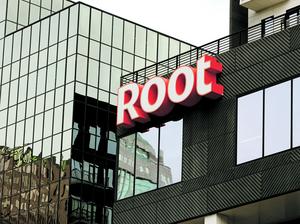
Root Inc.'s small rally in both financial performance and stock price is just the start, co-founder and CEO Alex Timm said.
The digital insurer is "absolutely" in the company of disruptive tech giants – Amazon.com Inc., Netflix Inc., Apple Inc. – that took several years to turn profitable while growing audience before their climb, Timm told Columbus Inno. The sentiment is companywide, he said.
"Everybody here is like, 'We’re coming out of this strong, and it might take the world a while to find out,'" he said. "I feel better about the business than I have in a long time."
Root (Nasdaq: ROOT) last week reported its lowest quarterly decline in cash reserves yet as a public company, $4 million, one of its best ratios of claims losses to premiums, and a better-than-expected return to customer growth.
In the second half of the year Root Insurance Co. is restoring some of its slashed marketing budget, executives said, and will keep pursuing growth so long as loss ratios stay in control.
Beneath the surface of the modest uptick, Timm said, all signals point to sustainable growth.
"We've got some really strong evidence right now that the technology does work," he said in an interview.
Over the past 18 months, Root focused on raising premiums, refining its predictive analytics software, and reining in fixed administrative costs, he said. Once it hits $1 billion in annual premiums booked, just less than double where it's tracking this year, the company turns profitable.
Executives have projected turning profitable within two years without raising additional outside capital.
One of the biggest indicators for Timm is comparing Root's quote-generating interface with the standard technology that legacy insurers use when presenting an online quote for vehicle sales or loans.
Root used that standard platform at first to quickly roll out its insurance offers with Carvana, the online used car seller. It amounts to "a well-placed ad," he said, which requires clicking through to as many as 24 pages of steps to apply.
Once Root turned on its own technology for Carvana – just a few questions, the same as if the consumer were using the Root app – the adoption rate tripled.
"It misses to say all technology is the same and all apps are the same," he said. "Sears also sold things online. Amazon still got ‘em."
Timm is evoking lofty company:
- Amazon went public in 1997 at a price of 7.5 cents, adjusted for splits. It did not turn profitable until 2003. Friday the stock closed at $139.57. While the stock has had sluggish and volatile stretches, since two months after going public it never traded below the IPO price.
- Netflix went public after five years in 2002, at an adjusted price of $1.15 per share, then fell by as much as 2/3. The company finally turned profitable the following year. The stock never dipped below the IPO price again after its first 10 months, but didn't really start climbing until 2015. It closed at $431.60 Friday.
- Apple was close to bankruptcy in 1997 and its stock fell to its lowest point, about 4 cents when adjusted. It had gone public at the end of 1980 at an adjusted price of 10 cents. In 2018 Apple became the first American public company to hit a market capitalization of $1 trillion, and this June the first to hit $3 trillion. The stock closed Friday at $181.99.
The difference is Root is using technology to disrupt a more complicated industry than retailing, said Jim Auden, managing director at Fitch Ratings. Not only must it invest in the engineering, but underwrite polices correctly and pay for vehicle loss and repair.
"There’s a big investment there and you need to build up the scale to really benefit from that," Auden said. "The jury is still out as to whether they’re a long-term enduring participant."





